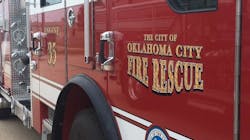OK Fire Chief Proposes Freezing 21 Spots Set for New Station
By William Crum
Source The Oklahoman, Oklahoma City
Larry McAtee says budget-cutting comes down to needs and wants.
Prioritize needs, says the Ward 3 councilman and public safety hawk, and save wants for a brighter tomorrow.
COVID-19's impact on public safety will be central to the city council's review starting Tuesday of City Manager Craig Freeman's proposed 2020-21 budget.
Police and fire were directed to plan for a combined total of more than $8 million in reductions, equal to 3.3% from an adjusted base, favored treatment compared to the 11.25% cuts required of other departments.
With the pandemic-induced slowdown in economic activity and oil-and-gas slump impacting sales tax revenue, budget managers project a 5.6%, or $27 million, shortfall in the general fund, the primary account for day-to-day expenses.
"Our firefighters are willing to do more with less to help our citizens get through this tough period," Scott Van Horn, president of International Association of Fire Fighters Local 157 in Oklahoma City, said last week.
"The bigger question is what will happen in the next few months," Van Horn said. "With the drop in oil prices along with shutting down the city, things could get a lot worse. Let’s hope they don’t."
To reach budget targets, Fire Chief Richard Kelley has proposed freezing 21 positions allocated to the new fire Station 38, leaving them unfilled.
Station 38 at SW 59 Street and Richland Road in the far southwest corner of Oklahoma City is, as it happens, in McAtee's ward.
Kelley said construction delays "already incurred ... make it inconceivable" Station 38 will be ready to go into service before the 2021-22 fiscal year.
Kelley also proposed idling fire trucks, most likely brush pumpers when grass fire danger is low, to save on overtime.
For fire, the situation is reminiscent of 2016, when brush pumpers were idled and construction of Station 29 in rural southeast Oklahoma City was put off as an 18-month downturn in sales tax tracked the last oil-and-gas slump.
Police Chief Wade Gourley proposed cutting 39 vacant patrol officer positions, up from a proposed reduction of five before COVID-19. The original strategy drew criticism in February from the Fraternal Order of Police.
In both cases, cutting funding for authorized positions without a guarantee of restoring the money might be viewed as a betrayal of voters who approved a quarter-cent sales tax increase in 2017 based on the city council's promises to hire more police officers and firefighters.
Public hearings on the 2020-21 budget begin Tuesday with a presentation by Public Works Director Eric Wenger.
Wenger proposed cutting a street resurfacing program to "minimal" levels as part of reductions. Twelve paving workers would be shifted into vacancies in drainage maintenance.
With more than 400 vacancies out of an authorized workforce of about 4,800, the budget director has said 2020-21 reductions likely will be achieved with few, if any, layoffs.
Still unclear is whether Congress will authorize federal funds to replace tax revenue cities were counting on before the pandemic.
Oklahoma City has received $114.3 million from the federal CARES Act and is holding back $59.3 million for unbudgeted COVID-19 expenses.
Strings attached to the money limit its use to expenses that weren't included in the budget as of March and are incurred before Dec. 30.
The balance is being directed toward coronavirus testing and tracing, small-business relief and help for individuals to pay bills, according to a resolution being voted on by the city council Tuesday.
Public hearings on the budget continue June 2 and 9, with final adoption scheduled June 16.
———
©2020 The Oklahoman
Visit The Oklahoman at www.newsok.com
Distributed by Tribune Content Agency, LLC.






